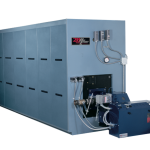There are numerous reasons that can cause a problem with your central heating, but one of the most obvious clues for any homeowner is when you notice your boiler losing pressure. There are numerous reasons why this could be happening, but in this article, we will discuss the three most likely causes, which in the vast majority of cases will help you get to the bottom of the problem quickly.
There Could Be A Leak In Your Central Heating System
Your central heating system is pressurised, and the fact that it is pressurised is a crucial component to ensuring that everything works as it should. Unfortunately, a leak within the system will cause the pressure to drop, which eventually will lead to other problems. In most cases, it should be relatively easy to detect the source of any leak. You may notice a stain on the paintwork or a wet floor, but not all leaks are that obvious. Even a minuscule leak will cause the pressure to drop. If you cannot detect the source of any leak yourself, there are specialist companies that offer a leak detection service. These companies have the specialist tools and knowledge to identify the source of virtually any leak regardless of size or location. In the situation where it seems impossible to find a leak, this may be a very shrewd investment, as it will quickly enable you to get to the source of the problem.
Check Your Combi Boiler Pressure Relief Valve To See If There Is Any Leaks There
The pressure relief valve contains a relatively small hole that lets water pass through when the pressure has exceeded a specified limit. Unfortunately, due to its relatively small size, it only takes a small quantity of debris to block the hole and cause your boiler to lose pressure. This is one of the most common faults with a combi boiler and, unfortunately, will require the expertise of a qualified heating specialist. Depending on the severity of the problem, the valve will either need to be replaced or can be cleaned, both of which are a relatively inexpensive fix.
Has Air Managed To Get Into The System?
Water is your hot water system is the secret sauce used to transport the heat around your home. Air is an unwelcome guest, which can cause numerous issues and reduce the efficiency of your system. Luckily, there are a few tests that anyone can perform to try to find the problem before you need to call out a heating engineer. The first thing to do is to bleed your radiators using a radiator key which can be purchased at any good DIY store. To bleed a radiator, you just need to turn the radiator key slowly in the valve, typically located at the top of the radiator, either on the left or right. As you open the valve, you will hear a hissing sound, which is the sound of the air escaping. Keep the valve open until the hissing stops and water starts to come out. When bleeding the radiators, it is normally best to start at the top of the house and work your way down. Always ensure that you have a towel or saucepan handy to catch or mop up the water when it starts to leak out. Once you have completely bled all the radiators, if the problem persists, then you may have a more severe problem, such as an airlock in your system. In this case, you will need to contact a heating specialist who will check for an airlock, or alternatively, may flush out your entire system. If it puts your mind at rest, the vast majority of boilers which lose pressure can be fixed relatively inexpensively, although there may be certain situations where a replacement boiler is needed.







